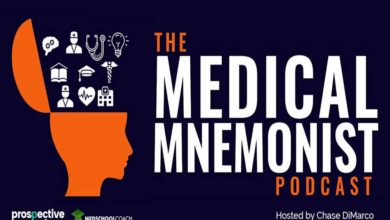In this third episode of the MedEdge Method mini-series, Chase DiMarco talks about preparation and studying. He dissects the actual methods and techniques you can use when creating the optimal study space, study technique, and study habits.
- [01:50] How to Ergonomically Optimize your Study Space
- [03:40] How to Focus on Studying Without Getting Distracted
- [05:12] Creating the Perfect Study Mindset
- [08:05] The Psychology of Willpower
- [09:50] The Pomodoro Technique for Medical Students
- [13:05] Using Activity-Based Costing to Improve your Study Habits
- [14:07] Achieve your Study Goals Using the WOOP Strategy
How to Ergonomically Optimize Your Study Space
For medical students, creating a mentally and physically ideal study space is crucial for productivity, time management, and academic performance. Therefore, the place you choose for study should be designed to promote health and productivity. Unfortunately, this is the one thing often overlooked by most students. Chase defines Ergonomics as the science of creating the perfect study space. Before you open your books, ask yourself, how is my desk, chair, computer, keyboard setup? Does this setup promote productivity and comfort? If not, it would be best to change to something that reduces fatigue, strain, and injuries.
However, even the best ergonomically optimized study space will be ineffective if you can’t limit the distractions around you. For example, if you’re constantly looking outside a window into a busy intersection, chances are, you’ll get distracted every five minutes. Further, if your phone is constantly buzzing with notifications, these can easily lead to the notifications taking precedence over your focus. Still, it’s always advisable to schedule breaks between study sessions to check in on what you missed. This allows you to get that fix without affecting your overall study momentum.
Creating the Perfect Study Mindset
It’s no secret; it’s hard to get motivated to study. Sometimes the urge to watch one more video or scroll through social media is hard to resist. This explains the countless tutorials on the internet nowadays on the guaranteed ways to help you achieve the perfect mindset. However, the ideal study mindset starts with your brain. Is your brain distracted, comfortable, confident, or anxious? If you’re struggling with any of the negative traits mentioned above, you can condition how you respond when stressful environments come up.
One good conditioning technique is the Pomodoro Technique, a strategy designed to tackle distractions, productivity, and burnout. Developed in the 1980s by Francesco Cirillo, the system is all about dividing your study schedule and breaks into regular, short increments to avoid study burnout. However, the Pomodoro breaks study time into 25 minutes installments, which is a somewhat short time frame for most medical students. So, tweak it a little bit and divide your schedule into longer but manageable bits.
The Psychology of Willpower
Now that you know where your brain is at, let’s dive deeper into the mindset aspect of studying. Chase explains that every student has either a fixed or growth mindset. Students with a fixed mindset do not believe they can improve on their academics or social life. In contrast, those with a growth mindset believe in improvement where challenges and new opportunities are perceived as pathways to success. Nevertheless, there are times when you feel like you’re just too lazy to do anything. People depend on willpower to diet, quit smoking, exercise, save, overcome procrastination, and accomplish goals.
This is evident in specific individuals who boast the desire and strength to overcome challenges and obstacles that stand in their way. So, how does one acquire the insatiable need to keep moving forward with unshakeable self-belief? The truth is, the one thing that makes them so unique is their ability to accept their weaknesses and still have the resilience to overcome any obstacle along their path. So, the next time you feel like not taking part in some reading, that’s the perfect time to build your willpower. Willpower is only built by getting out of your comfort zone and doing the things that make you uncomfortable.
Links and Resources
7 Habits of Highly Succesful Medical Students
Speed Learning with Howard Berg
Memory Training and Emotional Intelligence for Test Preparation with Howard Berg
For more study tips, grab a copy of Read This Before Medical School. Don’t forget to leave a rating! Share your experiences, tips, and suggestions to [email protected]. Or you can directly reach out to Chase on LinkedIn, Twitter, or Instagram. Join the Medical Mnemonist Master Mind Facebook group and find our Blog posts, Podcasts, and other Resources at FreeMedEd.org!
